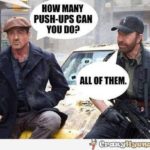As an Atlanta counselor, I’ve learned quite a bit over the past 22 days. Over 22 days ago I was challenged to do 22 pushups for 22 days as part of an initiative to raise awareness about suicide among veterans. Did you know that according to a report in 2012 an estimated 22 veterans die each day due to suicide? I’m so proud of myself for working the number 22 into this paragraph so many times. As I researched information for this article, I found out that a recent report (2016) estimated there are approximately 20 veteran suicides daily. I still chose to learn 22 things.

Then, I just did the pushups. I did them at the gym, at the house, at other people’s houses. An interesting thing happened. Of course, I told other people. But more importantly, I told myself. Over and over, I reminded myself of the very thing we are working to spread awareness about. As I did the pushups, I contemplated. Weird, I know. It’s pretty hard to think about anything else except the pain when I’m working out. But, because I was spreading awareness, my brain just went there. Every single day I was thinking about suicide, and the journey to overcome it.
Here are 22 things I learned.
- I’m selfish. We are all sometimes selfish. And, our selfishness gets the best of us. I found myself having to really force myself to do those pushups. I didn’t want to do them because they make me uncomfortable. They’re painful and one of my least favorite exercises. I’m selfish.
- The sacrifice of spreading awareness isn’t that big of a deal at all compared to the sacrifices our veterans make on a daily basis. They sacrifice for my physical, emotional, and spiritual safety and security. And yet, sometimes I grumbled right before I went to do those pushups. Of course, I quickly got myself in check because this sacrifice pales in comparison.
- It’s easy to forget. Because we are busy, we forget the things that are important. I would love to say I did all 22 days of pushups, never missing a day, but that’s not true. I missed days.
- Forgetting isn’t always intentional. I got so busy with the things on my plate that I just literally forgot to do the pushups. I should know better! I work with veterans and come from an Army family. You would think I wouldn’t forget! Of course, I had to elongate my time because it was important to me to do 22 days, even if they weren’t consecutive.
- Some veterans prefer to forget. I’ve seen this a lot in working with trauma. Traumatic events are difficult, and sometimes it’s easier to stuff the feelings, ignore them, or just try to forget. The problem with that is that our brains store the trauma ineffectively. So, our bodies and minds still react to the trauma in unpleasant ways. That can look like anxiety, depression, flashbacks, nightmares, physical illness, and more.
- It’s difficult to face your trauma. Dealing with trauma can actually cause more pain before it gets better. That’s because it feels like the wounds are being opened again. And, if a person hasn’t developed some self-care skills it can be very damaging. But, facing one’s trauma doesn’t have to be horrible. There are professionals who are well trained in walking people through this. They can slowly help with building self-care skills, processing memories, and healing the brain.
- It’s natural to want to stop the pain. I can’t say that I’ve ever been through what veterans go through. But, I thought of something while doing my pushups. When reaching that 18th pushup on the first day my arms hurt. I was in pain! I wanted to give up. I stopped thinking about why I was doing the pushups, and started thinking about PAIN. It’s crazy how our brains and bodies scream at us about such small things like pushups. They yell at us, telling us to stop the pain. I can only imagine where our veterans’ minds go through because of all of the pain they endure. Suicidal thoughts can act as that voice that’s yelling, telling them to stop the pain. Whether or not they chose service, whether or not they feel honored by service, they can still experience the pain of having experienced service.
- Even though we haven’t been through it, that doesn’t mean we can’t work to help. I haven’t personally been through war. I’ve never been sent away from my friends and family on a deployment. Still, I can help. I’ve worked in my career to learn about trauma, separation, emotional pain…etc. Because I’ve worked to build awareness, and build knowledge about these topics, I can help.
- Therapists aren’t the only answer, and medication isn’t either. There are so many things that can help people who are experiencing symptoms of trauma and depression. Simply being a listening ear, a shoulder to cry on, or a buddy to do an activity with can make all the difference. Also, there are other things that can help. Yoga, fitness, eating healthy, spirituality, support groups…the list goes on and on.
- Sometimes my perspective is so narrow, all I can think about is myself. The pain when doing that first set of pushups is the perfect example. For a moment, all I could think about was me. That pain moved my mind off of the reason I was doing what I was doing, and onto stopping the pain. I had to fight to resist thinking about myself. I’m working on that! I challenge you to do the same.
- War isn’t the only thing that causes people to contemplate suicide. Being in the military comes with many stressors, and our veterans need help with many issues that aren’t directly related with war. Sexual assault, being away from family, injury…there are so many things veterans experience that can cause symptoms of depression or
- It’s not fun being alone. Whenever I would stop to do my pushups I would become very aware that I was the only one doing them. Some of this probably has to do with my less-than-perfect form or the fact that they hurt, but still. I was alone. Loneliness can be felt strongly by veterans. It’s tough to go through things alone. Sometimes they are able to find support within their service community, family, or friends, and sometimes not. When you go through traumatic events it can feel extremely lonely. Reach out and love on a veteran!
- But sometimes it feels easier to be alone. I did enjoy that while I was doing my pushups no one was bugging me about my form. Noone was yelling at me to keep going. I just did what I felt like doing. That feels easier than having to be held accountable for things. I think that working through PTSD, depression, and other things that can contribute to suicidal thoughts can be difficult. What I learned from this is the key to surrounding yourself with other people, is surrounding yourself with the right people. I would not have wanted to have someone shouting at me about how horrible my pushups looked. I would have enjoyed having a friend right next to me, doing the pushups, telling me we could do it together and cheering me on when I accomplished it.
- Support is so important. I realized that the only person to push me to get through this challenge was me. I would tell myself “you have to keep going.” It would have been so much easier for me if I had a friend going with me, people calling me encouraging me, and people asking me how it was going. I got through it, but I thought about the fact that so many times military personnel are taught to be tough. They’re taught to be able to go it alone. But how much more bearable is it when we support them? So much!
- People don’t always want to pay attention. It’s not that they’re horrible. Sometimes it’s just because there is so much that’s negative in the world that they just want to block it out.
- Sometimes it feels easier to focus on the positive. When I was challenged to do the pushups, we had a lot going on in the US. The Orlando attacks had just occurred, and it felt like every day something else was happening that caused fear in my heart. It would have been easy for me to choose not to do the challenge, and focus on positive things. Thankfully, I work with veterans, and understand the importance of spreading awareness about this.
- People lack an understanding of mental health issues. Whenever I would tell someone I was doing the challenge the response would usually end up something like “oh, that’s cool” and the conversation would end. I’m definitely guilty of this in other areas. I don’t know enough about ALS, despite the awareness campaign similar to this one. I didn’t know the numbers about suicide among veterans before this challenge either. So, I understand. Do I think I need to improve? Yes. Do I think our country could benefit from increasing awareness about this? Yes.
- It became more tolerable over time. With the right approach, I was able to increase my strength and tolerance of the pushups, making it a whole lot easier at the end. Suicidality isn’t that simple. But, I do know that many times the pain feels severe and given the right approach people can reach a much more comfortable place of being. It takes time. It can be extremely rough. And it can be accomplished.
- There are things you just should not say. I’ve recently met with people with PTSD who have heard “just get over it” or “You need to get it together.” Please try not to be harsh with your words. I understand that PTSD and depression in others can be scary or frustrating, but going through it is so much worse. If you feel that someone needs change, try to offer help and support. Do not offer judgment.
- Sometimes you have to be uncomfortable to reach your goals. It wasn’t always convenient to do my pushups. I preferred to do them on these comfy mats they have at the gym, but they weren’t always available. Sometimes I did them on carpet, sometimes on tile, once on concrete. I just got the job done. I had to be uncomfortable in order to reach my goal, and that was rewarding. What are you avoiding because it’s uncomfortable? For some it’s exercise, for some it’s a conversation that needs to happen, for some it’s confronting your past, for some it’s offering support to someone…if you need to do it I challenge you to face being uncomfortable.
- Spreading awareness online can make a difference. During my challenge, I saw an article about how the ALS ice bucket challenge helped fund research that found a gene that contributes to ALS. Which can help researches develop drugs to target it. Here’s a link to some information. http://www.alsa.org/fight-als/ice-bucket-challenge.html . I wasn’t sure if my participation would make much of a difference when I was first challenged. But, I’m hopeful.
- There are ways you can help. One of the easiest ways you can help, is to decide to take the 22 day challenge yourself. Go ahead. Help spread awareness. You can also reach out to a veteran. Ask how you can be a friend, or how you can support them. Thank a veteran. Hang out with one. Let them know we appreciate them. They are not alone. Their sacrifice does not go unnoticed.

